Leading by Example
Perched on the precipice of change, both within and without, NUS continues to be at the vanguard of higher education. The AlumNUS looks at just what it takes to steer this venerable institution to greater heights during this time of great disruption, as well as how tomorrow’s leaders are being groomed today.

Not for the first time in its over century-old history, NUS is once again at a crossroads. On1 January 2018, Professor Tan Eng Chye (Science ’85) moved on from his role as Deputy President (Academic Affairs) and Provost of NUS to become the University’s President. He replaced Professor Tan Chorh Chuan (Medicine ’83), who stepped down after 10 years at the helm. A couple of months earlier, NUS also welcomed President of Singapore Madam Halimah Yacob (Law ’78) as its newest Chancellor.
These major leadership changes are occurring at a pivotal moment in history, against the backdrop of today’s so-called ‘Fourth Industrial Revolution’ characterised by a growing convergence of the physical, digital and biological spheres. The rise of smartphones and social media, Internet of Things–linked devices, and artificial intelligence applications in fields like self-driving cars are just the tip of the iceberg compared to the whole heap of breakthrough technologies developed over the last decade, irrevocably altering the way we work, study, play and live.
At a time when we can barely keep up with the speed of technological advancement, academic institutions are having to re-evaluate their objectives and strategies in grooming students for such a volatile, uncertain, complex and ambiguous (VUCA) world. For the new NUS President, one can imagine that a number of questions bubble up. What is the state of the University that he is inheriting? Is NUS’ leadership position in the current age of disruption more tenuous than might be thought? And how can NUS best produce the next generation of leaders?

A NOD TO THE RECENT PAST
Before looking to the future, it is worth taking a step back to see how far the University has come since the turn of the century. Two personages served as NUS President in the intervening period — Professor Shih Choon Fong (2000–2008) and Professor Tan Chorh Chuan (2008–2017) — each leaving their mark in different ways.
Under Prof Shih’s stewardship, NUS was transformed from a teaching university to a global, research-intensive university. He was instrumental in setting up the International Alliance of Research Universities in 2006 and chaired the Association of Pacific Rim Universities for four years, with NUS holding membership in both consortia. Now with NUS’ Faculty of Engineering, Prof Shih is also credited with bringing an entrepreneurial dimension to the University through the formation in 2001 of NUS Enterprise, which comprises divisions such as the NUS Overseas Colleges programme and the NUS Industry Liaison Office.
Prof Tan Chorh Chuan built upon these achievements and further elevated NUS’ standing on the world stage. He turned the University into a global research powerhouse and created a vibrant start-up culture. Collaborations with industry organisations and internationally-renowned universities expanded the educational opportunities open to students. Prof Tan also launched several pioneering initiatives to promote broad-based learning, including the Yale–NUS College liberal arts pedagogy, the residential college experience at NUS University Town (UTown), the grade-free scheme for freshmen and the revamped General Education curriculum.
While serving in his prior role as NUS Deputy President (Academic Affairs) and Provost, Prof Tan Eng Chye was none other than the chief architect behind some of the pioneering programmes. These and other achievements have helped NUS steadily climb up the global university rankings. The Times Higher Education World University Rankings 2018, released last September, places NUS 22nd — its highest position yet — making it the top Asian university for the third year running.
Clearly, the former Presidents have left the University in great shape — but it cannot afford to rest on its laurels. The challenge facing the new incumbent is how to continue NUS’ transformation journey into a world-leading university in an era of radical disruption and heightened global uncertainty.
FOCUSING THE LENS OF LEADERSHIP
In one of his final engagements as NUS President, Prof Tan Chorh Chuan was the guest speaker for the NUS Business School’s Leadership Dialogue Series. The talk, held on 2 November 2017 at the NUS Shaw Foundation Alumni House, addressed three key lenses of leadership: how to choose a leader, whether one should step up to be a leader, and what qualities make an effective leader.
A few things must be considered when selecting between candidates for the leadership position, be it as a CEO of a company, a head of department or a student group leader. “Start by asking yourself, ‘What are the most important goals you would like to achieve?’ Distil the most critical things for your unit that you hope to achieve with the new leader,” said Prof Tan. One should also assess whether the individual can fit into the organisational culture, while at the same time having the wherewithal to gradually shift it.
The decision over whether to take up a leadership role depends largely on one’s internal motivation, which in turn serves as a strong determinant of one’s commitment or ability to sustain effort. Prof Tan said that “constructive dissatisfaction” — “to convert dissatisfaction with something into a positive force for action and change” — is a powerful driver of leadership.
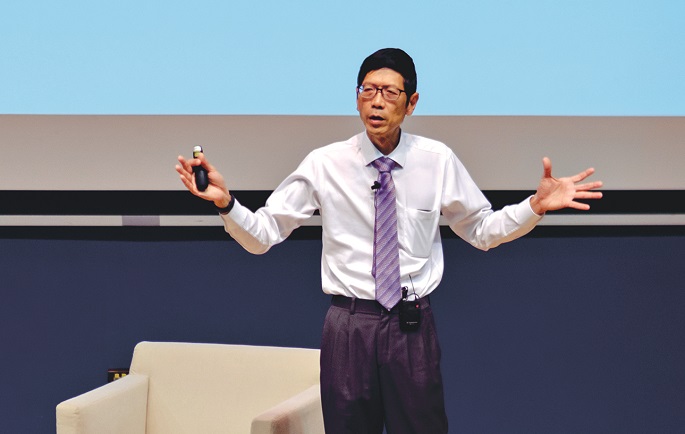
Based on his personal experience, Prof Tan identified some essential traits for effective leadership:
- HAVE A VISION OF WHERE YOU WANT TO BE. “Boil down your vision to its essential elements, and use this distilled set of ideas to motivate and energise activities across the institution.”
- MAKE YOUR VISION HAPPEN. “If you are able to implement bold new ideas, you can get a reinforcing cycle where ideas inform action and then that feeds into more new ideas and opportunities.”
- THINK AHEAD FIVE OR 10 YEARS TO WHAT YOU WOULD HAVE DONE BY THEN THAT COULD BE CONSIDERED CONSEQUENTIAL. “This focuses your mind on the highest-priority issues — those leading to significant improvement and having an enduring impact.”
- PERFECT YOUR PEOPLE SKILLS AND SYSTEMS-LEVEL THINKING. “This means zooming in on the fundamental areas that need attention in your institution, as well as zooming out to see the ‘big picture’ and connections with other sectors.”
- ENGAGE IN ADAPTIVE STRATEGISING. “Because things are changing so quickly, you have to continually think about and reshape your strategy and positioning, even while having a long-term destination.”
- PACE YOURSELF. “Leadership is a marathon, not a sprint. What matters is not how many hours you put in, but how much output you get per unit of time.”
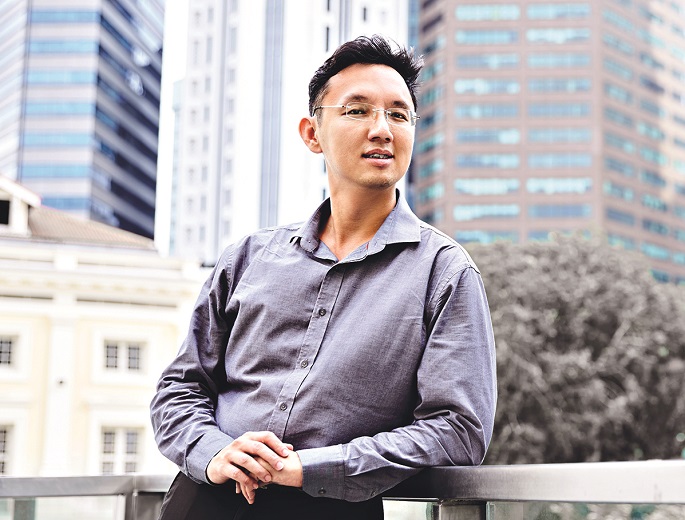
Associate Professor Ben Leong
NUS School of Computing
ACHIEVING FUTURE-READINESS
The most pressing concern for NUS, as for all universities, is making sure that its graduates find gainful employment. This is easier said than done in the present climate, where some have even questioned the very value and relevance of university degrees in today’s economy, in which many a maverick has struck it big in fields which he or she had no formal training in. Then there’s also the issue of technology, which is creating new jobs even as others are being lost. On the one hand, e-commerce has reduced barriers to entry for businesses, and more people are joining the ‘sharing economy’ every day through apps like Uber and Airbnb. However, this is happening at the expense of brick-and-mortar retailers and malls; traditional taxi companies and hotels are also hurting.
Amid the upheaval, a likely winner is the NUS School of Computing. “Our profession is intrinsically digital, so as long as our students focus on honing their skills, they will be well-prepared for the digital economy,” NUS’ Associate Professor Ben Leong of the Department of Computer Science tells The AlumNUS.
To help students across all disciplines prepare for the working world, the University established the Centre for Future-ready Graduates (CFG) in 2015. Besides providing career advisory services and linking students with employers, CFG runs an innovative programme called ‘Roots & Wings’ for all first-year undergraduates. This module equips freshmen with soft skills such as self-awareness, empathic communication and resilience, so that they can maximise their potential both personally and career-wise.
NUS alumni and working adults are also encouraged to upgrade their skills or acquire new ones at its School of Continuing and Lifelong Education (SCALE). Launched in 2016, SCALE offers a range of short courses and part-time degree programmes — mainly in computing and engineering — to boost their employability, as well as support Singapore’s manpower needs. Together with postgraduate programmes in specialised fields of study such as public health and public policy, there are opportunities aplenty at NUS to level up one’s qualifications and engage in lifelong learning.
Leadership is contextual; it is experiential. To teach leadership, students have to be in, or at least simulate being in, a real work environment.
Associate Professor Ben Leong, NUS School of Computing
However, Assoc Prof Leong admits that a degree alone — even in a high-demand area like computing — does not guarantee a well-paying job, nor will the degree-holder necessarily become a future leader. “I don’t believe that leadership can just be taught in the classroom. Leadership is contextual; it is experiential. To teach leadership, students have to be in, or at least simulate being in, a real work environment,” he says. Hence, the Bachelor of Engineering and Bachelor of Computing programmes are now among those that have a compulsory internship component.
THE CASE FOR CURIOSITY
Indeed, teachable moments for cultivating leadership can occur anywhere and at any time during one’s university years — as long as one adopts a curious and open-minded attitude. “A degree is not only about studying one’s chosen major; it is the best time to explore new things and gain breadth of exposure. The more people you meet, the more views you get,” says Dr Jingmei Li (Science ’06). A Life Sciences major, she is now a Senior Research Scientist and National Research Foundation Fellow at the Genome Institute of Singapore, where her team is working to improve early detection and prevention of breast cancer.
“I enrolled in NUS with the intention of learning what it takes to earn my keep in science — my bread and butter — but got so much more in the process,” says Dr Li. She underwent the University Scholars Programme (USP), a multidisciplinary academic programme for undergraduates; took part in a student exchange programme to the University of Melbourne, Australia; and also completed a Minor in Technopreneurship. “These experiences may not all have been relevant to life sciences, but they were interesting and shaped my love for learning.”
The Technopreneurship minor in particular gave her an edge over other less business-savvy scientists. “My internship stint at a startup doing customer support and publicity taught me a lot about how to interact with people, and how to communicate ideas and products. The latter has certainly helped me in my grant writing and in making people understand my research,” says Dr Li. She also serves as Adjunct Assistant Professor for the Department of Surgery at NUS Yong Loo Lin School of Medicine.
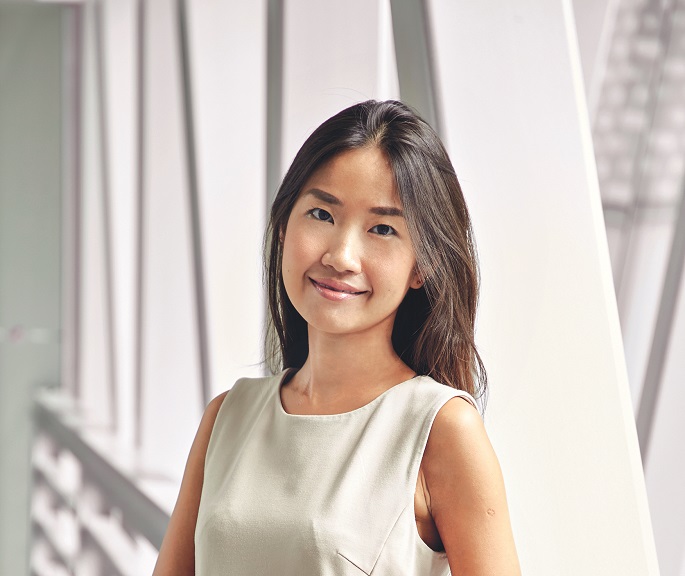 Dr Li Jingmei, Genome Institute of Singapore
Dr Li Jingmei, Genome Institute of Singapore
PERSONALISED LEADERSHIP
Dr Li’s work in identifying women most at risk of developing breast cancer due to genetic differences, and in finding new treatment options for them, has not gone unnoticed. She was one of three individuals to win the Young Scientist Award at the President’s Science and Technology Awards 2017, the nation’s highest honour bestowed on exceptional researchers and engineers in Singapore.
What is her image of a good leader? “Someone who uncovers the potential of each team member by treating each person differently and by using different methods to help them succeed,” says Dr Li, 35. “In science, we are moving towards the trend of personalised screening or treatment. Perhaps ‘personalised leadership’ is also the way to go. This would strengthen emotional bonds and build up human capital.”
Other facets of University life, including participation in student clubs, interest groups, varsity sports teams and Hall committees, also provide opportunities to exercise leadership. Ms Nur Darlene Binte Nasril, currently in her third year of the Bachelor of Science (Project and Facilities Management) programme, is the President of the NUS Malay Language Society. Known by its Malay acronym PBMUKS, the Society’s 130 or so members encourage the use of the Malay language among youths by organising annual events such as music workshops, theatrical productions and poetry slams.
“I have always had an interest in the Malay language and culture, so I was naturally drawn to PBMUKS,” explains Ms Darlene. “As President, I have to put myself in the shoes of others before making any decisions. It is still a learning process for me, but by working with and managing those under my wing, I am constantly learning how to deal with people, engage in dual perspective and communicate my ideas efficiently. I may not be the best at what I do, but I’m happy to learn because the nature of my future work — probably in facilities management or events management — requires a lot of communication with others.”
Speaking on behalf of student leaders, Ms Darlene, 22, hopes to develop a stronger connection between University administrators and the various co-curricular activities. “Talk to us, come to our events and see what we do first-hand,” she urges. “The more recognition or support we receive from NUS, the more connected we will feel to the University and the more pride we will have in being ‘NUSers’.”

Ms Nur Darlene Nasril, President, PBMUKS
THE WINNER DOES NOT TAKE ALL
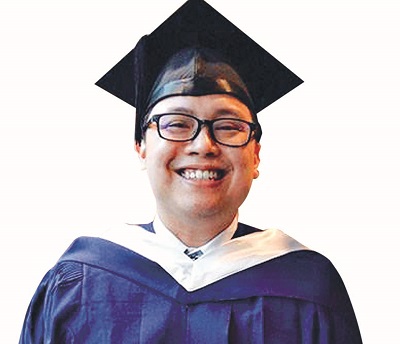
NUS Master of Business Administration graduate Mr Marco Ordonez (Business ’16), valedictorian of his class, tells The AlumNUS what he learnt as President of the NUS MBA Social Impact Club.
“My experience leading the NUS MBA Social Impact Club was crucial in shaping my perspective on business leadership. Traditionally, we think of businesses as exploitative or focused on making the most money today, regardless of what happens in the future. But I think that the most successful companies are those that have made it a point to figure out ways they can contribute to society as part of their business model — doing good and doing well, at the same time.
This not only helps create financial returns but also sustains their market for years to come.
I am currently a Business Development Manager for a company that develops clean and renewable energy solutions in my home country, the Philippines. I am happy to play a role in helping the Philippines as it transitions to a low-carbon energy future. I feel like I am, in my own small way, contributing to the betterment of the country.”
TOMORROW’S CHANGE MAKERS
Another highlight of Prof Tan Chorh Chuan’s tenure as NUS President was the ramping up of University-wide efforts to give back to society. These include the Chua Thian Poh Community Leadership Programme (CTPCLP), inaugurated in 2011 to nurture the next generation of change makers; and the NUS Day of Service, an annual community outreach and charity initiative pioneered by the NUS Alumni Advisory Board in 2016.
While service to the community has always been a core value of the University, this greater emphasis on social responsibility comes at an opportune time as the disruptive changes unleashed by technology are causing a mixed effect on society. Not everyone is benefiting from the digitisation of services. In fact, the poorer segment of the population risks falling even further behind as they are slow to adopt new innovations, less likely to upskill or reskill themselves, and more vulnerable to declining incomes or job losses.
Recent efforts by NUS to bridge the inequality gap also coincide with a growing awareness among today’s youth of social injustice. There is even a word for this phenomenon — ‘wokeness’ — which has come to be a defining feature of the millennial generation.
For newer graduates, then, the undergraduate journey is where they each discover how they can best contribute to society.
“Higher education, to me, is not only about developing critical thinking skills, but about being world-ready to make a social impact in the world,” says Ms Siti Adriana Binte Muhamad Rasip (Arts and Social Sciences ’16). While pursuing her degree, the Political Science major and USP scholar participated in the CTPCLP, under which she initiated two projects. The first one sought to empower children and youths with special needs by making them ambassadors for animal welfare, while the second project involved a research attachment to the Ministry of Social and Family Development’s Social Service Office @ Tampines.
Inspired by her undergraduate experience, Ms Adriana, 24, is now a Community Social Worker at the South Central Community Family Service Centre. “I would like to make an impact in empowering lower-income families and lifting them out of poverty,” she says. And she is not the only one wanting to make a difference: in November 2017, the Chua Thian Poh Community Leadership Centre (CTPCLC) was established through Mr Chua’s second gift of $5m to NUS to fund the next phase of development. With a physical space in UTown that aims to become a focal point for community development activities on campus, the CTPCLC plans to double its current annual intake to 80 students — and enlarge the pool of future community leaders.
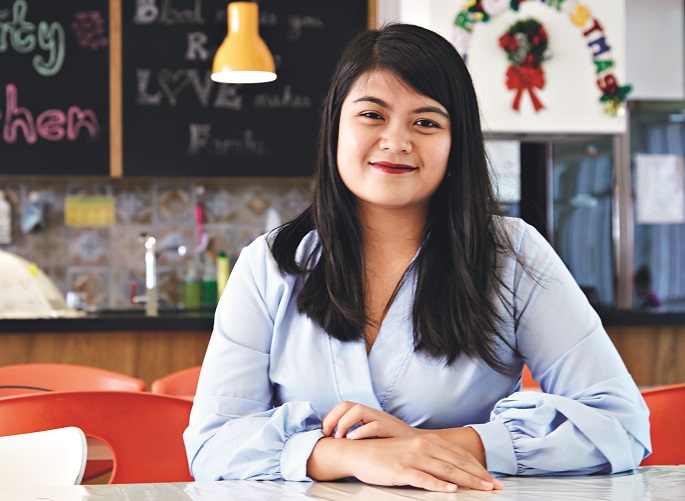 Ms Siti Adriana Muhamad Rasip
Ms Siti Adriana Muhamad Rasip
Community Social Worker
NAMES TO REMEMBER
Here is just a smattering of NUS alumni who have gone on to become distinguished leaders in their respective fields:
- Dr Noeleen Heyzer (Arts and Social Sciences ’71), former Under-Secretary-General of the United Nations (2007–2014)
- Mr Quek Siu Rui (Business ’12), Mr Lucas Ngoo (Engineering ’13) and Mr Marcus Tan (Business ’11), co-founders of Carousell that was listed by Forbes as one of ‘20 Startups To Watch In 2016’
- Dr Neo Mei Lin (Science ’09), marine biologist and conservationist selected as a World Economic Forum Young Scientist (Class of 2016) and TED Fellow (Class of 2017)
- Dr Balaji Sadasivan (Medicine ’79), former Chairman of the Executive Board of the World Health Organization (2007–2010)
- The Honourable the Chief Justice Sundaresh Menon (Law ’86), current Chief Justice of Singapore
- Dr Yaacob Ibrahim (Engineering ’80), current Minister for Communications and Information, Minister-in-charge of Muslim Affairs and Minister-in-charge of Cyber Security, Singapore
MAINTAINING THE MOMENTUM
No one harbours any illusions about how tough the task facing the new NUS President is, least of all Prof Tan Eng Chye himself (read our interview with him on pages 18-19). He will undoubtedly come across challenges in trying to balance the priorities of the different faculties, programmes and student organisations, and preparing students for a future without knowing what changes are around the corner.
But the good news is that NUS has been down this road before, albeit not at such a rapid pace of change. NUS has always had competent, visionary leaders, and a solid succession plan to ensure a smooth transition each time someone new inhabits the Office of the President. So if history is any indication, the University and its students are in good hands.